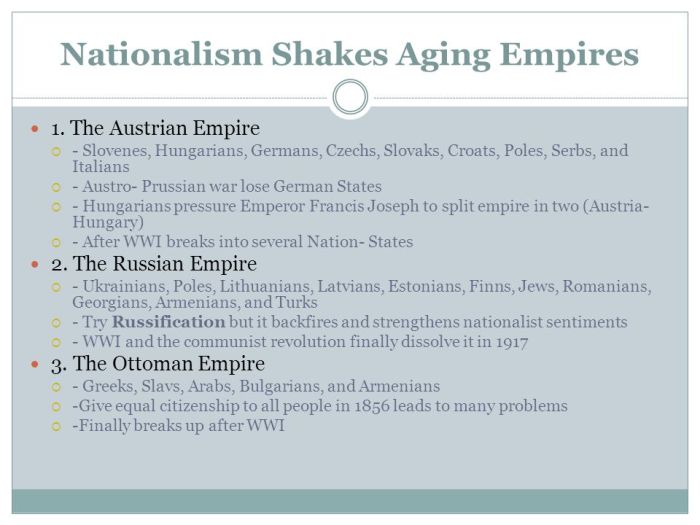As “Which Aging Empires Suffered from the Forces of Nationalism?” takes center stage, this opening passage beckons readers into a world crafted with scholarly authority, ensuring a reading experience that is both absorbing and distinctly original.
Nationalism, a potent force that has shaped the destinies of empires throughout history, played a pivotal role in the decline of several aging empires. This essay delves into the impact of nationalism on these empires, examining its economic, political, cultural, and social consequences.
Impact of Nationalism on Aging Empires

Nationalism, a potent force that emphasizes national identity and unity, profoundly impacted the destinies of aging empires. Nationalistic sentiments ignited revolts and independence movements within imperial territories, challenging the authority of ruling powers. Aging empires like the British, French, and Ottoman Empires faced significant challenges due to the rise of nationalism.
Economic and Political Consequences of Nationalism
Nationalism had significant economic consequences for aging empires. Disruptions in trade and economic instability occurred as nationalist movements sought to establish independent economies. Politically, nationalism eroded imperial authority, leading to the emergence of new political movements and the eventual decline of imperial power.
For instance, the rise of Indian nationalism weakened British control over the subcontinent, ultimately leading to India’s independence in 1947.
Cultural and Social Effects of Nationalism
Nationalism had a profound impact on the cultural and social fabric of aging empires. It fostered the rise of national identities and the decline of imperial cultural dominance. Nationalist movements played a key role in shaping social movements and promoting cultural change within imperial territories.
The Irish nationalist movement, for example, contributed to the revival of Irish culture and language, challenging British cultural hegemony.
Case Studies of Aging Empires, Which aging empires suffered from the forces of nationalism
The British Empire, the largest empire in history, faced significant challenges due to the rise of nationalism. Nationalist movements in India, Ireland, and other colonies weakened British control and eventually led to the empire’s decline. Similarly, the Ottoman Empire, once a vast and powerful empire, faced nationalist uprisings in the Balkans and the Middle East, contributing to its eventual collapse.
Historical Significance and Modern Implications
The impact of nationalism on aging empires holds significant historical significance and relevance for understanding modern-day conflicts and political movements. The experiences of aging empires provide valuable lessons about the challenges and opportunities that arise when nationalist sentiments clash with imperial authority.
These lessons continue to shape contemporary global politics, as nationalist movements continue to play a role in shaping the destinies of nations and empires.
Common Queries: Which Aging Empires Suffered From The Forces Of Nationalism
Which aging empires were particularly vulnerable to the forces of nationalism?
Empires with diverse populations, weak central authority, and economic disparities were more susceptible to nationalist movements.
How did nationalism contribute to the economic decline of aging empires?
Nationalist sentiments often led to trade disruptions, economic instability, and the rise of protectionist policies.
What were the political consequences of nationalism for aging empires?
Nationalism weakened imperial authority, fostered political unrest, and led to the emergence of new political movements.



